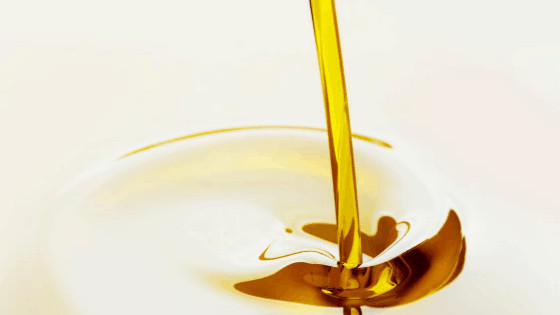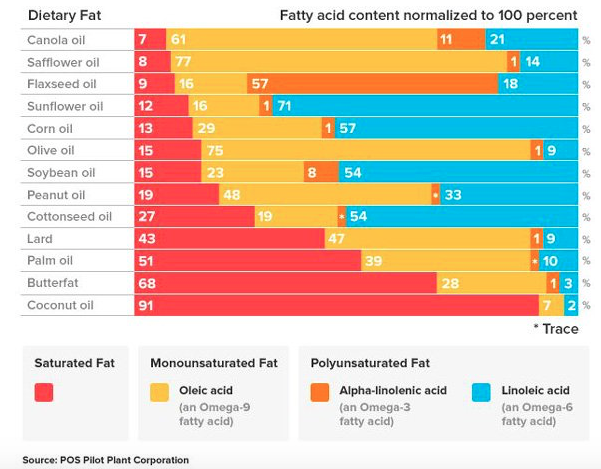
22 Apr Vegetable Oil Showdown
When I clean out pantries of my clients, I almost always find the wrong kind of cooking oils, especially vegetable oil. (No judgment here, because I was in those shoes before as well.) It’s because the standard American diet suggests using these cooking oils.
Most oils that are suggested to use are vegetable oil, canola oil, soybean oil, corn oil, sunflower oil, you get the idea. Today, I’m going through why these oils aren’t ideal for cooking with & eating and what oils you should use. Pay attention! It might get a little science-y in here.
Why Are These Oils Recommended In The First Place?
Good question! Pretty much, these oils are very cheap to make and can be highly industrialized. You’ll find these oils in almost anything from chips, salad dressings, condiments, roasted nuts, and the list goes on. This is why reading ingredients is ESSENTIAL. There are foods out there that you wouldn’t think would have oils (among other things) and they do. So always being vigilant with anything that has a food label.
Saturated, Monounsaturated, Polyunsaturated…HUH?!
Here comes the science-y part. If you’ve heard that saturated fats are bad, check out another blog I wrote that debunks that thinking. Saturated fats are essential to our health. It’s the most stable fat because all the carbon links are filled with a hydrogen. This is great because this means that saturated fats don’t oxidize easily when heated. (When an oil oxidizes easily, free radicals that can be harmful to our body will develop.)
With most industrialized vegetable oils, monounsaturated and polyunsaturated fats usually are the main source of fats. This is good & bad. Monounsaturated fats have one carbon chain that doesn’t have a hydrogen attached. Polyunsaturated fats have many carbon chains without a hydrogen attached. Polyunsaturated fats are the most unstable fats when cooking because they have so many chains that are not complete so they oxidize VERY easily.
How Does Omegas Tie Into These Fats?
This is where it can get tricky. Omega-3 and omega-6 are tied into the polyunsaturated fats. Omega-3 has been known to be healthy for us providing an anti-inflammatory effect on our body, but omega-6 can actually be an inflammatory to our body. In food, they are both along side of each other, so when they are at a good balanced ratio, there is nothing to be concerned about. BUT, when they don’t have a balanced ratio and omega-6 outweighs omega-3, this can cause whole body inflammation. This study showed that the lower the ratio between omega-6 & omega-3 lowers your chance for cancer, heart disease, autoimmune diseases, and many other diseases. Another study in the Journal of Nutrition and Metabolism states the same thing.
With monounsaturated fats, they contain omega-9s. Omega-9 is naturally created by our body, so we don’t have to intake it much from food. This study showed that rats who were given oils higher in omega-9 (monounsaturated fats) had decrease in tumor activity in breast cancer. Another study showed that oleic acid (high in omega-9) had a positive effect with heart disease, cancer, autoimmune diseases and more. So, monounsaturated fats don’t make or break if I eat the oil. It’s more based on the polyunsaturated fats & the ratio between the omega’s.
These industrialized vegetable oils have that bad ratio though. If you take a look at this chart, it’s a great resource I found that I had to share that give you a great visual on how the oils are made up.

Take a look at coconut oil. Coconut oil is a very stable fat, high in saturated, low in polyunsaturated fats. Oils that are higher in saturated fats are the fats you should cooking with. Remember, they don’t oxidize as easily. Look at cottonseed oil. Cottonseed oil should NEVER be consumed because of the high polyunsaturated content and the omega-6 ratio to omega-3 is SO high. (Side note: Cottonseed oil is also technically a textile, so it’s not regulated by the FDA since it’s not food. Guess what is highly sprayed on it? Round-up. Look here to read about Round-Up & the dangers of it.) Take a look at olive oil. Olive oil is perfectly fine to consume, even though it’s low in saturated fats. It’s high in monounsaturated fats, which aren’t as harmful as polyunsaturated fats.
Now take a look at a highly industrialized oil – canola oil. If you take a quick look, you’ll see “oh, it’s not too high in polyunsaturated fats”, BUT if you look at the omega-6 and omega-3 ratio. Omega-6 outweighs omega-3 by 50%. Safflower oil, sunflower oil, soybean oil, peanut oil, corn oil should all be avoided. The ratios of omegas are crazy.
Take a quick look at flaxseed. You’ll see most of the oil is polyunsaturated oil, but look at the ratio. Omega-3 has MUCH more weight than omega-6. I just wouldn’t cook with it, since it’s not stable. It would be a great oil for salad dressings.
The Ultimate Problem
Western diets are HUGE in omega-6 oils and not enough omega-3, so we are constantly battling the inflammation. These oils should never be a staple in our diet. The average person that eats the SAD (standard American diet) consumes ALOT of their calories from these oils. Unfortunately, most condiments we use have this. We end up consuming much more than we should. If you have a couple tortilla chips in a soup or taco salad that use one of these oils, it won’t break you (as long as you aren’t eating this on a weekly basis). Avoid these oils as much as you can. Consume oils that are higher in saturated fat, like coconut oil, red palm oil, butter, lard and even the oils that have a better ratio, like flaxseed and olive oil. These are much more natural than the cheap highly processed industrial vegetable oils.


